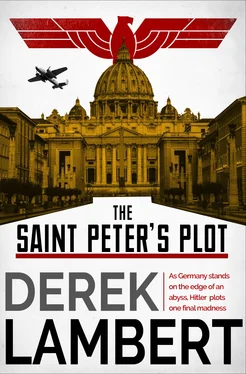The Sicilian said to Angelo: “But don’t despair, my friend. You did what you thought was right,” and Maria realised that the Sicilian was taking over. I would never have said such a thing to Angelo.
And to the three of them the Sicilian said: “We must stop fighting among ourselves. We must make decisions and keep to them.” Your decisions, Maria thought. “And if anyone doesn’t …” He spoke with his hands. “In Sicily we have always had a way of dealing with such people.” He threw the knife which this time embedded itself in Mussolini’s throat.
The two younger men remained sulkily silent.
“You see,” the Sicilian said to Maria, “I thought it was you who had ordered the killing of Dietrich.”
And now, she thought, he has all of us.
“You think I’m such a fool?”
He shook his head, smiling. “But you are a woman. A woman is ruled by her heart.”
Anger flared. She stubbed out the cigarette in a saucer. “I am not a Sicilian woman.”
“You are a beautiful woman.”
The anger expanded, although she was pleased by the blatant flattery.
“You’re out of date. Times have changed. This isn’t just a man’s war. Perhaps,” she said more calmly, “things have changed forever. Maybe the war has given us that.”
“Maybe,” the Sicilian said, emptying the last of the grappa down his throat.
“So what do we do now?” Carlo asked.
The Sicilian said: “We have to get guns. We have to meet the other partisani. We have to get organised. But first,” he said to Maria, “there is something you must do — find out why Dietrich is here.”
“Perhaps he’s looking for Mussolini,” Maria said tentatively.
“Possibly. But I doubt it. Otto Skorzeny’s been put in charge of that. And Hitler wouldn’t risk a clash of personalities like that — Skorzeny and Dietrich. Christ, what a couple!” the Sicilian exclaimed, admiration in his tone. “But in any case, they’re all wasting their time in Rome. Mussolini was taken to Gaeta and then to the Pontine Islands.”
“It’s not just Mussolini they’re after,” said Angelo. “They want to get Badoglio, his ministers, the King, every one of the shit-heads,” said Angelo, whose hatred embraced all authority-
“Even Skorzeny will have his work cut out,” the Sicilian said. “They’re all nicely tucked away, a lot of them at the Macao barracks surrounded by half the Italian army.”
“Perhaps Dietrich brought a message from Hitler,” Maria ventured.
The Sicilian brushed aside the suggestion. “The German ambassador to The Holy See could have delivered that. Any number of Germans could have delivered it. The Führer,” sarcastically, “could have telephoned The Vatican himself. “No,” he said thoughtfully, “there was something more to it than that. I think Dietrich was on personal business. SS business.”
He stood up, one hand feeling the bald patch. He was not a tall man, but his muscles pushed against his open-necked white shirt. The undiscerning would have likened his face to that of a peasant, but there was authority there — family authority — and small refinements in the set of his brown eyes, the sensitivity of the line from nose to mouth. None of which diminished the overall impression of implacable brutality.
He turned to María. “Now you must get to work. After all, you have the best spy in The Vatican.” He took her arm. “Come, I’ll see you home. By the way,” he said as they reached the foot of the stone steps, “did you know it’s Mussolini’s sixtieth birthday today?”
IV
Maria Reubeni’s Vatican contact was praying. As usual his prayers were tortured.
Kneeling beside his bed in his Vatican quarters he pressed his hands together and shut his eyes as he had done when he prayed as a child in the Bronx.
“Please, God, forgive me for my devious ways.” Consorting with the Nazi bishop and at the same time betraying his confidences.
“And for doubting the Holy Father.” Wondering why, despite his financial help to the Jews, the Pope had not been more outspoken in his condemnation of their persecutors.
“And” — bowing his head lower — “for the times I have doubted Your infinite wisdom.” For permitting this terrible war irrespective of whether its victims found ultimate salvation.
Here he paused, because he was about to seek forgiveness for a carnal sin that he knew he would repeat since he was powerless to prevent it.
“And forgive me for failing to sublimate desires of the flesh.” Maria Reubeni.
Father Liam Doyle, twenty-five years old, grey-eyed with wavy brown hair and keen, Celtic features already stamped with the conflict of innocence and knowledge, prayed a little longer before rising and going to the window of his frugally-furnished room, and staring bleakly across the shaven lawns of The Vatican gardens where children played and fountains splashed in the dusk.
He had felt confused ever since his arrival at The Vatican two years ago from the small church in New York. There his principles and his volition had seemed inviolate: to help the poor — there were enough of them in the Bronx — and to guide the congregation, mostly Irish like himself, in the ways of God.
But Liam Doyle, son of a policeman and a seamstress, one of eight children, had been blessed, or cursed, by a facility with languages. First he had become fluent in Latin and then he had mopped up Spanish and Italian so that he was much in demand in the ghettos. Word of his linguistic abilities reached St. Patrick’s Cathedral and he was dispatched to Rome as a young seminarian.
The honour frightened him, but delighted those who worshipped in his grimy little church with its anti-Papal graffiti on the outside walls. “Patrick Doyle’s boy going to join the Vicar of Christ. Now there’s a thing.” Their delight was heightened by the fact that he would take with him the sins to which they had confessed — he was much preferred in the Confessional to the Bible-faced Father O’Riley — those sins, that is, that had escaped the wrath of Patrolman Patrick Doyle.
Liam Doyle’s fear had been well justified. He could not equate the splendid isolation of The Holy See with Christian charity. When he explored its treasure troves he remembered the pawn shop across the street from his old church where women hocked their wedding rings for a dollar.
Nor could he understand the arrogance of some of the monsignori in a world addled with poverty, starvation and suffering. Blessed are the meek …
And he never felt at ease in this state within a city. These blessed one hundred and nine or so neutral acres bounded by St. Peter’s Square, The Vatican walls and the walls of the Palace of The Holy See, constituted by the Lateran Treaty in 1929, where less than one thousand people lived tax-free lives of privilege.
Was this the way Jesus, the son of a humble carpenter, would have wished it?
But perhaps the fault lies in myself, Father Doyle brooded as the dusk thickened and settled on the courtyards, chapels and museum; on the grocery, pharmacy and radio station of the minute state from which the spiritual lives of three hundred and seventy-five million Catholics were ruled. There has to be authority and it has to be garbed with spendour: it is a throne. And there has to be immunity from outside pressures: a regal purity, perhaps.
Liam Doyle sighed. My trouble, he decided, as a plump cardinal strode past in the lamplight beneath like a galleon in full sail, is that I see every side of an argument. I lack decision.
He decided to brew a pot of tea on the gas-ring beneath a Crucifix on the wall. And while he waited for the kettle to boil he read the worn Bible that his mother had given him twenty years ago, seeking as always answers to his confusion. From the testaments he found solace, but it was only temporary, and when he awoke in the morning the doubts were still there, fortified by sleep.
Читать дальше












